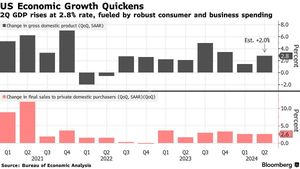President Trump's looming tariffs on imports from Canada, Mexico, and China are set to take effect today, February 1, 2025, as the White House reaffirms its commitment to impose these duties amid growing concerns over economic impacts.
White House press secretary Karoline Leavitt confirmed on Friday afternoon, just hours before the tariffs were to be implemented, "I can confirm tomorrow, the February 1st deadline continues." The tariffs, as previously announced, include a substantial 25% levy on imports from both Canada and Mexico, alongside 10% on goods from China.
The potential imposition of these tariffs has raised alarm among business leaders and economists alike. Matthew Holmes, the public policy chief at the Canadian Chamber of Commerce, voiced concerns over the economic fallout, stating, "From higher costs at the pumps, grocery stores, and online checkout, tariffs cascade through the economy and end up hurting consumers and businesses on both sides of the border." He warned the tariffs would lead to price increases on many goods, making life more expensive for consumers.
Adding to the uncertainty, President Trump has cited issues surrounding migration and illegal fentanyl as motivations for the tariffs. The announcement of these tariffs has left many businesses and trade leaders from both Canada and Mexico confused and frustrated, as they prepare for the impacts these new taxes will bring across the border.
Canadian Prime Minister Justin Trudeau announced on Friday Canada would respond with strong countermeasures should Trump move forward with the tariffs. He stated, "It’s not what we want, but if he moves forward, we will also act." Canada reportedly has detailed targets for immediate tariff retaliation, including duties on products such as orange juice from Florida, Trump’s adopted home state. There’s also talk of broader retaliatory measures possibly reaching C$150 billion worth of U.S. imports.
Mexican President Claudia Sheinbaum has also expressed her concerns, stating, "We will always defend the dignity of our people, respect for our sovereignty, and dialogue as equals without subordination." She indicated Mexico is ready to engage in discussions but is also prepared for retaliation if necessary.
Economists are projecting the proposed tariffs could lead to significant economic repercussions, not just for Mexico and Canada but for American households as well. A report from the Tax Foundation emphasized the tariffs could serve as an effective tax increase on U.S. households, estimating costs could rise as much as $830 for the year. This unexpected burden on everyday consumers could exacerbate inflation concerns already prevalent within the U.S. economy.
Leavitt rebutted claims from earlier reports indicating the tariffs could be delayed until March 1, reinforcing the White House's stance to proceed as planned. "I was just with the president in the Oval Office, and I can confirm tomorrow, the February 1st deadline continues," she insisted.
The ramifications of these tariffs could dismantle 30 years of close economic cooperation among the U.S., Canada, and Mexico, particularly with regards to the newly implemented USMCA trade agreement. Tariffs could severely disrupt nearly $1.6 trillion worth of trade across North America, impacting everything from aluminum and lumber imports to fruits, vegetables, beer, and electronics.
With financial markets showing sensitivity to tariff announcements, the U.S. dollar experienced fluctuations based on the conflicting reports concerning the implementation timeline. Following Leavitt's confirmation, the dollar showed signs of strength against both the Canadian dollar and Mexican peso.
American businesses are now left grappling with uncertainty as they await full clarity on tariff details and potential exemptions. Leaders from both Canada and Mexico have urged for the importance of dialogue to address their grievances before these tariffs wreak havoc on the already integrated supply chains.
Given this complex situation, economic experts warn the looming tariffs exacerbate existing pressures, with potential inflation results from such policy shifts. Federal Reserve Chair Jerome Powell previously highlighted the delicate balance needed to prevent price hikes amid variable economic conditions.
Today marks the dawn of new trade dynamics, with the specter of tariffs adding strain not only on North American trade relations but also on the wider economy. Trump’s moves signal turning tides; whether this leads to greater economic strain or ignites diplomatic efforts for resolution remains uncertain.



